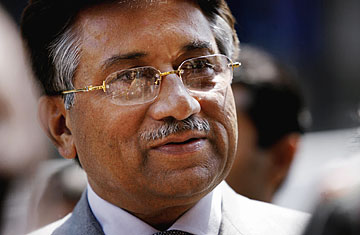
Pakistani President Pervez Musharraf during a visit to Cordoba, Spain, April 26, 2007
President George Bush doesn't have time for Pakistani President Pervez Musharraf these days. The two haven't spoken since the dictator declared a state of emergency across the country Saturday, putting the Bush Doctrine at odds with Bush's War on Terror. What communication there has been has hewed to the pattern of a schoolyard romance on the rocks. Instead of calling the Pakistani leader himself, Bush delegated Secretary of State Condoleezza Rice with the task Monday of conveying a list of demands. "We expect there to be elections as soon as possible," Bush asked Rice to tell Musharraf. Furthermore, Musharraf "should remove his military uniform," said Bush. "I asked him to restore democracy as quickly as possible," he said. Well actually, he asked Rice to ask him. Nicely.
This delicate dance is a result of Musharraf's uniquely powerful hold over the White House. The Bush Administration continues to insist it wants Musharraf to stay on the path to democracy, relinquish his position as head of the military as he promised and hold elections before January 15. But it is still unclear what happens if Musharraf doesn't do any of these things. Bush's pro-democracy goals for the country seem as much in conflict as ever with the U.S.'s other goal — to stamp out the Taliban in Afghanistan and dismantle terrorist networks operating inside Pakistan.
The U.S. has given Pakistan more than $10 billion in aid since 9/11, most of that directly to the Pakistani military to fund its efforts ferreting out al-Qaeda leaders taking refuge in ungoverned tribal regions that border Afghanistan. This cash, which comes to roughly $150 million a month in aid, is the U.S.'s only real leverage with Pakistan. Rice said Sunday that she would be reviewing the funding in light of Musharraf's coup d'etat over his own civilian government.
But cutting off aid is a risky venture. U.S. officials are concerned about how seemingly few results Musharraf has delivered for the money. However, no one wants to be around to see what will happen if his regime is allowed to collapse. "The U.S. is unlikely to ditch Pakistan and cut off all aid," says Teresita Schaffer, a 30-year State Department veteran and director of the South Asia program for the Center for Strategic and International Studies. "They have to continue working with Pakistan on Afghanistan and terror-related stuff." Schafer suggests that the U.S. could start making more distinctions about where the money goes.
Currently, the funding arrives either in the form of military equipment or as virtually unfettered cash, for Musharraf's government to do with as it pleases. But the options are limited. The U.S. might get the Musharraf government to focus on counter-terrorism by cutting off money that would otherwise go toward paying down Pakistan's debt. However, that might just help Musharraf's military in silencing the opposition. Pakistan watchers are concerned that U.S. money is being diverted from counter-terrorism to anti-democratic crackdowns like this one.
Secretary of Defense Robert Gates said Monday the Pentagon would be looking into its military assistance programs to Pakistan, but added, "we are mindful not to do anything that would undermine counter-terrorism efforts." With those efforts so closely tied to Pakistan's military, most experts in Washington expected the U.S. to make little more than superficial changes to the cash flow heading into Musharraf's coffers.
In the meantime, Musharraf has suspended the constitution, blacked out domestic TV news broadcasts and arrested lawyers, human rights advocates and opposition political party figures. State-run Pakistan Television on Monday said Musharraf had assured ambassadors he was "determined to remove my uniform once we correct these pillars — the judiciary, the executive and the parliament." Musharraf's Prime Minister Shaukat Aziz reiterated on Monday that the election would be held on schedule.
Some observers in the U.S. and Pakistan are still holding out the possibility that Musharraf's main reason for imposing martial law was to rid himself of his bête noir, the "literalist" Supreme Court led by chief justice Iftikar Chaudhry, who is now under house arrest. That tribunal not only posed a danger to the validity of Musharraf's election as president in early October but also to the U.S. deal forged with opposition leader Benazir Bhutto that allowed her to return to Pakistan from exile as a symbol of resurgent democracy. With the persnickety high court "cleansed," Musharraf may now be able to find a face-saving way to transition into the presidency while giving up his military command.
The worry is that Musharraf may not have enough time to do all this. His approval ratings in Pakistan are at an all-time low. By Monday, rumors were spreading of a coup that would oust Musharraf. One had Pakistan's new Vice Chief of Army Staff, General Ashfaq Kyani, taking his place. But officials in Washington are not putting much stock in those rumors. For one, Kyani is an old comrade of Musharraf's. Furthermore, military uprisings against Musharraf, they say, are a perpetual rumor in Pakistani politics and impossible to substantiate. It is a testament to the woeful state of the Pakistani political imagination that the only solution it can come up with to a military dictator is a military coup.
